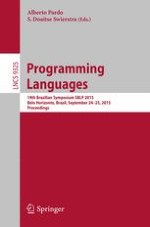
2015 | OriginalPaper | Chapter
Automatic Inference of Loop Complexity Through Polynomial Interpolation
Authors : Francisco Demontiê, Junio Cezar, Mariza Bigonha, Frederico Campos, Fernando Magno Quintão Pereira
Published in: Programming Languages
Publisher: Springer International Publishing
Activate our intelligent search to find suitable subject content or patents.
Select sections of text to find matching patents with Artificial Intelligence. powered by
Select sections of text to find additional relevant content using AI-assisted search. powered by